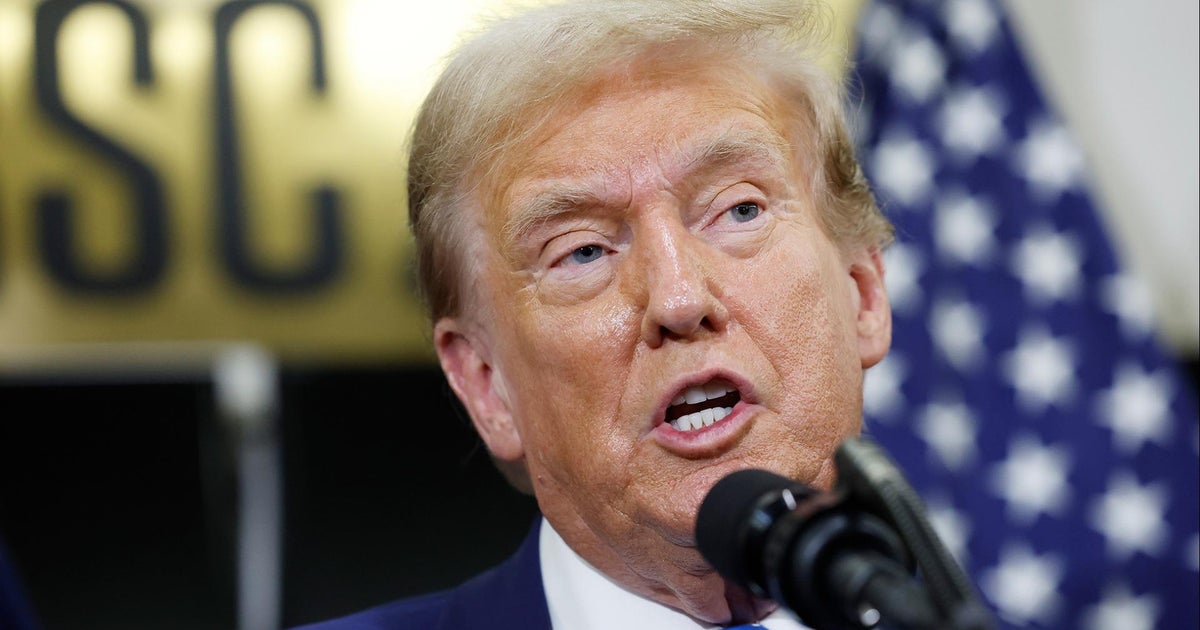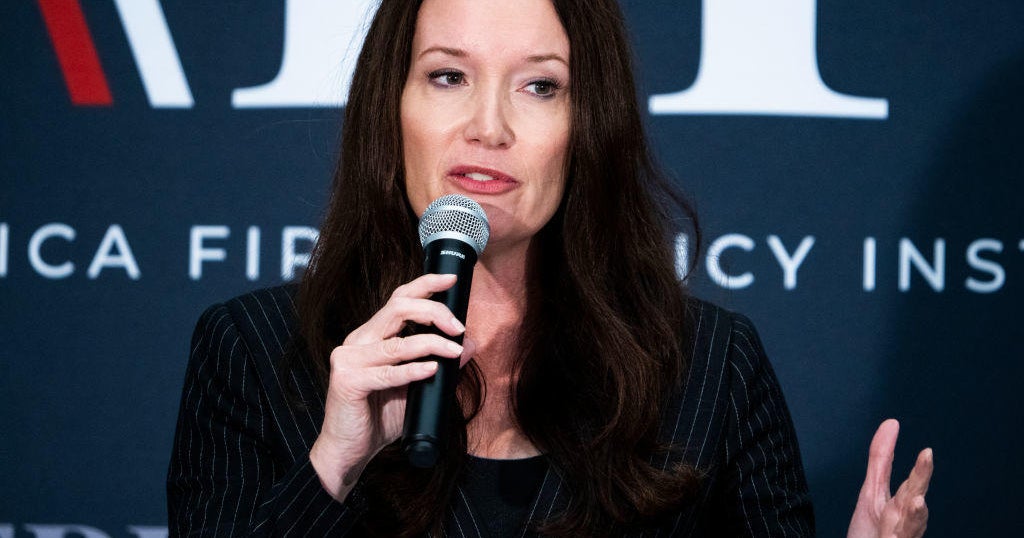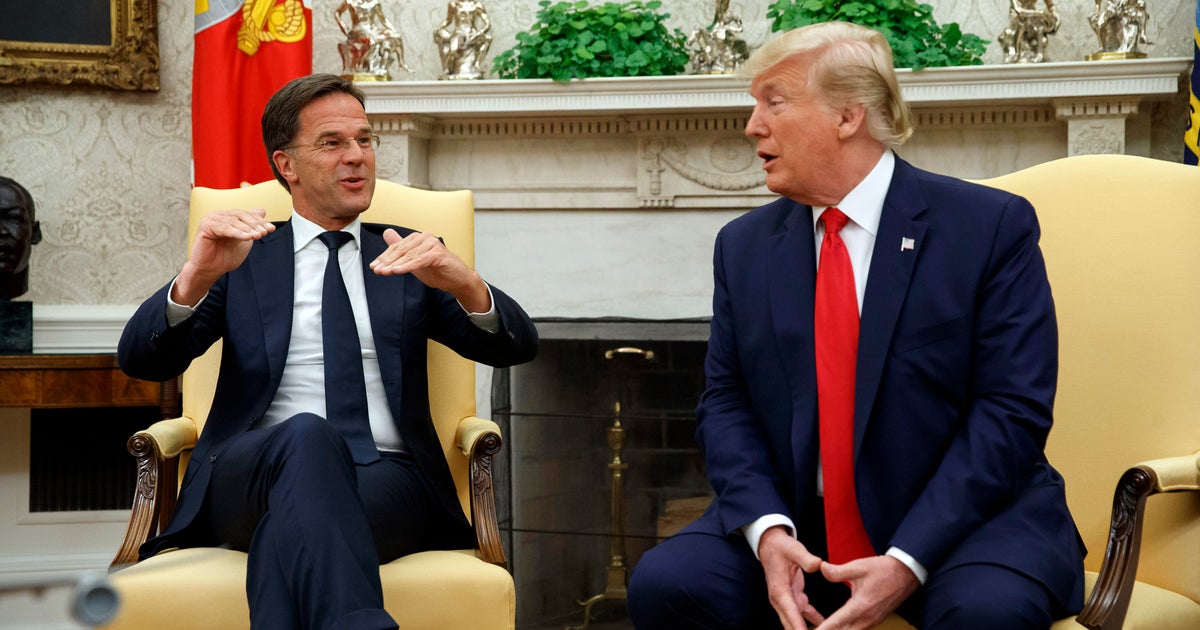CBS News
Trump is proposing a 10% tariff. Economists say that amounts to a $1,700 tax on Americans.

Former President Donald Trump is pledging to supercharge one of his signature trade policies — tariffs — if he’s re-elected this November, by imposing 10% across-the-board levies on all products imported into the U.S. from overseas. The idea, he has said, is to protect American jobs as well as raise more revenue to offset an extension of his 2017 tax cuts.
But that proposal would likely backfire, effectively acting as a tax on U.S. consumers, economists spanning the political spectrum say. If the tariffs are enacted — with Trump also proposing a levy of 60% or more on Chinese imports — a typical middle-class household in the U.S. would face an estimated $1,700 a year in additional costs, according to the right-leaning Peterson Institute for International Economics.
Meanwhile, the left-leaning Center on American Progress has also crunched the numbers and projects roughly $1,500 per year in extra costs for the typical household. The reason, according to experts: Companies in the U.S. that import goods from abroad typically pass the cost of tariffs onto American consumers; relatedly, domestic manufacturers then often raise their own prices.
Who would pay the price?
The biggest impact of higher import tariffs would likely fall on low- and middle-income consumers because they spend a larger share of their income on goods and services than wealthier Americans, according to Kimberly Clausing and Mary Lovely of the Peterson Institute.
“If you are an economist, you know right away that tariffs are taxes. If you put a tariff on imported goods, it means they become more expensive” and competitors can raise their prices, Clausing told CBS MoneyWatch.
Trump is selling “snake oil,” added Lovely. “It’s really on steroids, and you have to speak a little louder and say, ‘This is really going to affect you’.”
The bottom line, both Clausing and Lovely said, is that Trump’s tariff proposals would likely boost consumer prices, a concern after two years of surging inflation. The typical American household would feel the biggest pinch through materials and goods bought by U.S. companies, such as lumber for construction, and which would be passed onto them through $610 in additional annual costs, the Center on American Progress analysis estimated.
Middle-class households would also pay $220 more a year for cars and other vehicles, $120 more for gas and other oil products, and $90 a year in additional food costs, according to the policy analysis firm.
Trump campaign spokesman Steven Cheung didn’t respond to requests for comment.
Tariffs have long been used to advance U.S. trade policies by both the right and left, as well as to curry favor with labor unions. And Americans generally support tariffs because they believe they protect U.S. jobs from overseas manufacturers.
In practice, policymakers tend to apply targeted tariffs that serve to protect a specific industry or product. For instance, President Joe Biden last month instituted a new tariff on Chinese electric vehicles, semiconductors, batteries, solar cells, steel and aluminum. The goal is to prevent China from undercutting U.S. companies and threatening domestic manufacturing jobs, according to the Biden administration.
“The basic thing is that people view tariffs as job saving, and say, ‘It’ll cost me a little more and I want to do that because I want to help steelworkers’,” Lovely said. But, she added, “We see a lot of misunderstanding about how trade works and what tariffs mean for people.”
Do tariffs protect jobs?
Lovely and Clausing point to existing evidence about the impact of tariffs enacted by Trump during his presidency, when he put levies on Chinese goods as well as Mexican products. But rather than protect employment, offshoring of U.S. jobs continued during the Trump presidency, according to Reuters, citing Labor Department data.
“People are being sold a bill of goods, but the data shows it’s not helping them in their daily lives,” Clausing said. “That’s the hard thing about being an economist — everything lines up and people say, ‘No, tariffs seem good’.”
Noted MIT economist David Autor and his co-authors said in a January research paper that Trump’s 2018-2019 trade war “has not to date provided economic help to the U.S. heartland,” failing to raise employment in protected sectors. In fact, retaliatory tariffs from countries targeted by the Trump administration had the effect of “clear negative employment impacts, primarily in agriculture,” Autor found.
The one success of Trump’s trade war, Autor concluded, was political. “Residents of regions more exposed to import tariffs became less likely to identify as Democrats, more likely to vote to reelect Donald Trump in 2020 and more likely to elect Republicans to Congress,” the researchers wrote.
It’s likely that many Americans didn’t notice the price increases during the Trump 2018-19 trade war because they were more targeted than a 10% across-the-board tariff would be, Lovely and Clausing said.
“If you look at set of imports targeted by Trump in his presidency, it was maybe one-tenth of trade, and companies like Walmart might have spread out some of that pricing increase across goods, so it’s really non-transparent,” Clausing said. “My prediction is that if the worst happens and he puts a 10% tariff on everything, people will notice that.”
CBS News
Capturing Moriah Wilson’s Killer – CBS News

Watch CBS News
Be the first to know
Get browser notifications for breaking news, live events, and exclusive reporting.
CBS News
How to watch the Minnesota Vikings vs. Chicago Bears NFL game today: Livestream options, more

Getty Images
The Minnesota Vikings will take on the Chicago Bears today. The Vikings are currently 8-2, an impressive run so far this season, and will be looking to add a fourth win to their current streak after last Sunday’s 23-13 win against the Tennessee Titans. The Bears, on the other hand, are entering this game on the heels of a four-game losing streak after a tough 20-19 loss against the Green Bay Packers last Sunday.
Here’s how and when you can watch the Vikings vs. Bears game today, whether or not you have cable.
How and when to watch the Minnesota Vikings vs. Chicago Bears
The Vikings vs. Bears game will be played on Sunday, November 24, 2024 at 1:00 p.m. ET (11:00 a.m. PT). The game will air on Fox and stream on Fubo and the platforms featured below.
How and when to watch the Minnesota Vikings vs. Chicago Bears game without cable
You can watch this week’s NFL game on Fox via several streaming services. All you need is an internet connection and one of the top options outlined below.
Fubo offers you an easy, user-friendly way to watch NFL games on CBS, Fox, NBC, ABC, ESPN, and NFL Network, plus NCAA football channels. The Pro tier includes 200+ channels and unlimited DVR, while the Elite with Sports Plus tier adds NFL RedZone and 4K resolution. New subscribers get a seven-day free trial and all plans allow streaming on up to 10 screens simultaneously.
You can watch today’s game with a subscription to Sling’s Orange + Blue tier, which includes ESPN, ABC, NBC, and Fox. The plan offers 46 channels with local NFL games, nationally broadcast games and 50 hours of DVR storage. For complete NFL coverage, add Paramount+ to get CBS games, or upgrade with the Sports Extra add-on for additional sports channels like Golf Channel, NBA TV and NFL RedZone.
Watching NFL games, including Fox broadcasts, is simple with Hulu + Live TV, which includes 90 channels, unlimited DVR storage, and access to NFL preseason games, live regular season games and studio shows. The service includes ESPN+ and Disney+ in the subscription.
Want to watch today’s game live on your smartphone? If so, NFL+ streaming service is the solution you’re looking for. It lets you watch NFL Network and out-of-market games on mobile devices, with an upgrade option to NFL+ Premium that includes NFL RedZone for watching up to eight games simultaneously. Note that NFL+ only works on phones and tablets, not TVs.
CBS News
How to watch the Detroit Lions vs. Indianapolis Colts NFL game today: Livestream options, more

Nic Antaya/Getty Images
The Detroit Lions will face off against the Indianapolis Colts today. The Lions enter this game as top contenders with a near-perfect record of 9-1 so far this season. The Colts, who are 5-6 this season, could have a tough game on their hands against the Lions but will be looking to rack up another win after prevailing over the New York Jets in a tight game last Sunday.
Here’s how and when you can watch the Colts vs. Lions game today, whether or not you have cable.
Here’s how and when to watch the Detroit Lions vs. Indianapolis Colts
The Lions vs. Colts game will be played on Sunday, November 24, 2024 at 1:00 p.m. ET (11:00 a.m. PT). The game will air on Fox and stream on Fubo and the platforms featured below.
How and when to watch the Detroit Lions vs. Indianapolis Colts game without cable
You can watch this week’s NFL game on Fox via several streaming services. All you need is an internet connection and one of the top options outlined below.
Experience NFL action like never before with Fubo’s comprehensive sports streaming platform. From Sunday showdowns to primetime matchups, catch every NFL game across major networks including CBS, Fox, NBC, ABC, ESPN and NFL Network. Choose the Pro package to unlock 200+ channels and limitless DVR storage, or elevate your game-day experience with the Elite with Sports Plus package, featuring NFL RedZone’s commercial-free scoring highlights and stunning 4K quality.
Test drive the service with a no-commitment seven-day free trial, and share the excitement with family and friends — Fubo supports simultaneous streaming on up to 10 devices, so everyone can watch their favorite teams.
You can watch today’s game with a subscription to Sling’s Orange + Blue tier, which includes ESPN, ABC, NBC, and Fox. The plan offers 46 channels with local NFL games, nationally broadcast games, and 50 hours of DVR storage. For complete NFL coverage, add Paramount+ to get CBS games, or upgrade with the Sports Extra add-on for additional sports channels like Golf Channel, NBA TV and NFL RedZone.
Watching NFL games, including Fox broadcasts, is simple with Hulu + Live TV, which includes 90 channels, unlimited DVR storage, and access to NFL preseason games, live regular season games and studio shows. The service includes ESPN+ and Disney+ in the subscription.
Want to watch today’s game live on your smartphone? If so, NFL+ streaming service is the solution you’re looking for. It lets you watch NFL Network and out-of-market games on mobile devices, with an upgrade option to NFL+ Premium that includes NFL RedZone for watching up to eight games simultaneously. Note that NFL+ only works on phones and tablets, not TVs.









